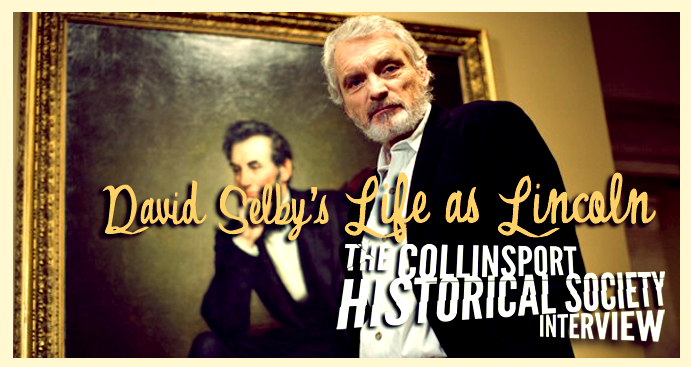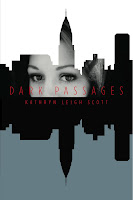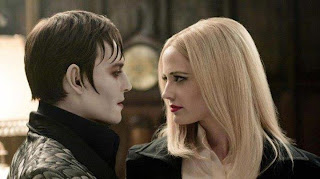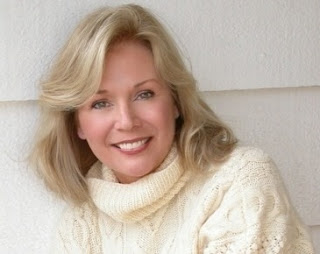(NOTE: This interview with David Selby was first published on Feb. 25, 2013. Seeing how today is Presidents Day, it seemed like a good time to nudge this feature back to the top of the website. This conversation was taken from one of our podcasts, which you can listen to in its entirety HERE.)
If you’re visiting a website called THE COLLINSPORT HISTORICAL SOCIETY, odds are you’re pretty familiar with David Selby. The actor got his first taste of professional success when he was cast on DARK SHADOWS, and has had a lengthy career on stage, television and movies, most recently trying his hand (or voice, as it were) in the animated feature films THE DARK KNIGHT RETURNS as Commissioner Jim Gordon.
If you’re visiting a website called THE COLLINSPORT HISTORICAL SOCIETY, odds are you’re pretty familiar with David Selby. The actor got his first taste of professional success when he was cast on DARK SHADOWS, and has had a lengthy career on stage, television and movies, most recently trying his hand (or voice, as it were) in the animated feature films THE DARK KNIGHT RETURNS as Commissioner Jim Gordon.
But it’s Abraham Lincoln who has beckoned to Selby since
the earliest days of his acting career. He first played Lincoln on stage in
1965 in the plays THE LAST DAYS OF LINCOLN and PROLOGUE TO GLORY during his
college years. Lincoln would go on to be his last stage role before signing on to
DARK SHADOWS a few months later in 1968. Even though movies and television offered
him high-profile work, Selby continued to stay active on the stage, returning
occasionally to reprise Lincoln whenever the opportunity presented itself. His
most recent turn was in 2009, in the play THE HEAVENS WERE HUNG IN BLACK at
Ford’s Theater. Barack Obama, who had just be elected president, was among
those in attendance when the theater re-opened after a lengthy renovation.
With President’s Day looming a few weeks ago, I thought it
might be interesting to step away from Collinsport and speak with him about his
interest in Honest Abe. Here’s what
happened.
| David Selby, center, in the outdoor play PROLOGUE TO GLORY at Kelso Hollow Theatre, Ill., in 1965. Photo courtesy of Selby's book, MY SHADOWED PAST. |
I think it’s interesting that we’ve moved away from the
romantic aspects of Abraham Lincoln during the last 20 or 30 years, and
are starting to focus on him as a human being.
DAVID SELBY: You had all of the mythology, and the myth
became bigger than the man. And you had to dig down deeper to get to the man.
And Lincoln was quite a politician, very ambitious. I have no doubt that he’d
hold his own in debates with any politician today.
About four year years ago … I was in D.C.
rehearsing a new play about Lincoln. They were re-opening Ford’s Theater at
that time. It had been closed for a couple of years for renovation. They had
never done a play about Lincoln and I loved the piece. Then I went back last
year, exactly this time last year, doing a play called NECESSARY SACRIFICES. It
was a play about the relationship between Lincoln and (Frederick) Douglass, the black
leader.
How do you approach Lincoln as a character? There’s not much
archival material about the man, and there are no recordings of his voice. It seems that
actors playing Lincoln tend to play against other actors. How do you bring
something new to Lincoln as a character?
DAVID SELBY: I don’t think I approached it any different
than Daniel Day Lewis did in the movie. You try and scrape away the myth.
There are various newspaper records … that comment on the timber of
his voice and all those kind of things. His law partner, William Hearnond, you
read his recollections … and I put a lot of stock in Hearndon’s notions. And
then you read all of Lincoln’s writing. There’s a ten-volume collection that I
have, recollections of his secretaries, (John G.) Nicolay and (John) Hay, his
young secretaries.
As an actor, there’s just a wealth of material, there’s
almost too much material. Plus, I had all of the background that I had when I
was in school in Illinois. Then my family, my own family, came over the
Allegheny Mountains approximately the same time as Lincoln’s family. My family moved further
north into the northern part of what was then Virginia. So I tended to trust all
of the family pictures that I had in my collection. I tended to trust my own
gait, my own accent that I recalled from those days. I had loads of personal
material.
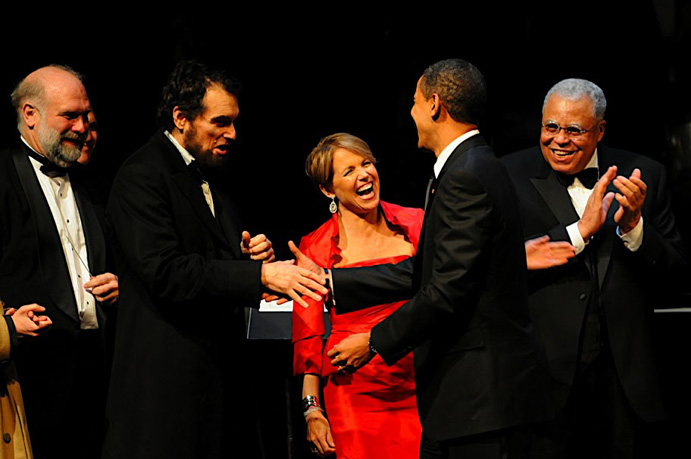 |
| David Selby, Katie Couric and James Earl Jones greet President Barack Obama at the Ford’s Theatre Reopening Celebration, February 11, 2009. Photo by Reflections Photography, Washington, D.C. |
With all of those years of experience between MR.HIGHPOCKETS in the 1960s and NECESSARY SACRIFICES just a few years ago, how has
your approach to the character changed?
DAVID SELBY: Well, just your experience in life. You’re a little more savvy, you know what I mean? One of
the things about HIGHPOCKETS and PROLOGUE TO GLORY was that they (were set in Lincoln's) young years, so I had that advantage. I wasn’t any more sophisticated than
Lincoln was at that particular age.
By the time you do NECESSARY SACRIFICES, you’ve got years of looking at the world, living in the world and forming values about right and wrong … about fairness, injustice and all of those things. You’ve lived through the civil (rights movement) era with (Martin Luther King) being assassinated, when I was on the A Train in New York City, reading about it, seeing the headline in the Post. I was part of the protests when I was doing DARK SHADOWS, the (Students for a Democratic Society) movement, which was run by a guy named MARK RUDD in those days.
Then you had Bobby Kennedy’s assignation, and my friend, RAFER JOHNSON. I don’t know if you know who he is, but Rafer was a gold medalist in the 1960s in the Olympics, and Rafer was with Bobby Kennedy when he was assassinated at the Ambassador Hotel. Rafer actually grabbed the gun from Sirhan Sirhan and forgot he had it in his hand.
I had all of that kind of history, very deeply personal history, going into THE HEAVENS WERE HUNG IN BLACK.
By the time you do NECESSARY SACRIFICES, you’ve got years of looking at the world, living in the world and forming values about right and wrong … about fairness, injustice and all of those things. You’ve lived through the civil (rights movement) era with (Martin Luther King) being assassinated, when I was on the A Train in New York City, reading about it, seeing the headline in the Post. I was part of the protests when I was doing DARK SHADOWS, the (Students for a Democratic Society) movement, which was run by a guy named MARK RUDD in those days.
Then you had Bobby Kennedy’s assignation, and my friend, RAFER JOHNSON. I don’t know if you know who he is, but Rafer was a gold medalist in the 1960s in the Olympics, and Rafer was with Bobby Kennedy when he was assassinated at the Ambassador Hotel. Rafer actually grabbed the gun from Sirhan Sirhan and forgot he had it in his hand.
I had all of that kind of history, very deeply personal history, going into THE HEAVENS WERE HUNG IN BLACK.
Let’s skip forward a few decades. After seeing the unrest
and anger in the ‘60s over casual injustices, what were your feelings while
standing on stage at Ford’s Theater, dressed as Lincoln and speaking to the
nation’s first African American president?
DAVID SELBY: Well, first of all, you’re standing before the
president of the United States. The office, itself, carries weight and
respect. There was a sense of history and the journey that had been traveled.
But I’m not one of those who feels racial injustices has been settled, by any
means. I think Lincoln would have loved pulling the voting handle for
Obama.
You mentioned in an interview in 1968 that you were
interested in doing a one-man show about Lincoln. How long did it take before
that came to pass?
DAVID SELBY: I never did do a one-man show. I was asked to
do a one-man show, and then decided I’d write my own. I was in Houston working
on a play there. I worked on it there, rehearsed it there. (I did) rehearsals in
L.A. and took the play to a couple of trials in West Virginia, Morgantown being
one of them.
The play was called, at the time, LINCOLN AND JAMES, and was about a caretaker who oversaw the Lincoln Memorial. It was his job to make sure the statue was clean and in good condition all of the time. What happened, in this situation, is he’d worked a double shift on a July 4th weekend and the humidity got to him and he had a heat stroke. I don’t quite follow that in the play, but that was the germ of the idea: To write my own play about a man who works at the Lincoln Memorial. In the process of the play, Lincoln comes to life in the man’s imagination.
The play was called, at the time, LINCOLN AND JAMES, and was about a caretaker who oversaw the Lincoln Memorial. It was his job to make sure the statue was clean and in good condition all of the time. What happened, in this situation, is he’d worked a double shift on a July 4th weekend and the humidity got to him and he had a heat stroke. I don’t quite follow that in the play, but that was the germ of the idea: To write my own play about a man who works at the Lincoln Memorial. In the process of the play, Lincoln comes to life in the man’s imagination.
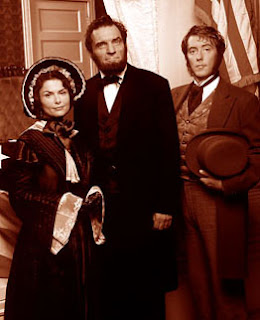 |
| Selby as Lincoln on TOUCHED BY AN ANGEL. |
You also played Lincoln on an episode of TOUCHED BY AN
ANGEL. How did that happen?
DAVID SELBY: It came about because they had a part about
Lincoln, and the gal who created (TOUCHED BY AN ANGEL) became aware that I had done
(the character.) Also, a friend of mine knew her also. Ernie Wallengren. Ernie
had written on a television show I did, FALCON CREST. He also wrote a show
called PROMISED LAND that I believe she had a hand in, and I did an episode of
that. It was a great role, a cowboy … wonderful. Anyway, what happened on
TOUCHED BY AN ANGEL, before I started … my mother passed away, and I told them
I couldn’t do it. They told me they would wait for me. So they did, and I could
hear my mother saying, “Go do it, David. Go do it.”
That’s a courtesy you don’t hear about too often in
Hollywood.
DAVID SELBY: Yeah, television waits for nobody. But she’s a
pretty special gal.
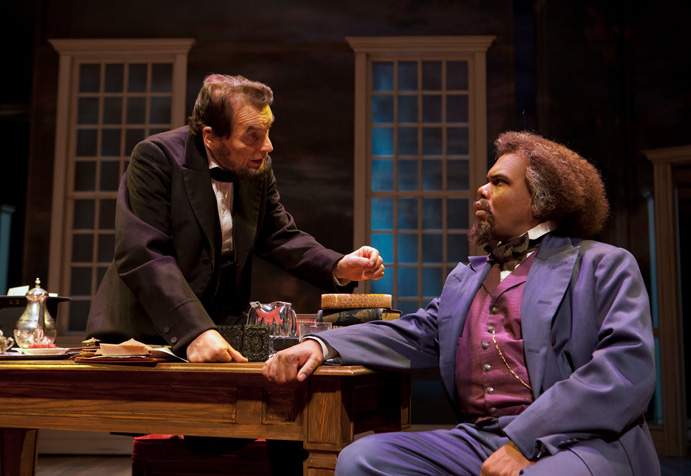 |
| David Selby, left, as Abraham Lincoln and Craig Wallace as Frederick Douglass. Photo by Ford's Theatre/Laura Keane. |
Which of your performances as Lincoln has been your
favorite?
DAVID SELBY: THE HEAVENS ARE HUNG IN BLACK, simply because I
like the piece. And because it was at the reopening of Ford’s Theatre and it
was very special to stand in Ford’s Theatre and look up at Lincoln’s box, where
the president sat. Everything came together there. Obama was elected president …
I mean, the gods smiled upon us. Everything lined up. I can’t explain how it
felt … it was just very, very wonderful. And every time I go through a bad spot
or something, all I have to do is flash back to that ... because everything was
promising. It was a wonderful time, and HEAVENS was a dream play that took
place during, I think, about a seven or eight month period of Lincoln’s life.
What was the dramatic hook for that story?
DAVID SELBY: All of the things that were going on … Lincoln
lost his son, and that was devastating for him, and certainly for Mary. And,
also during that time, things weren’t going well, battle-wise. He wanted the
issue to be emancipation ... he read a preliminary to his cabinet. He wasn’t
asking for their advice, he just was telling them what it was going to be. Then
it was decided they needed a victory on the battlefield, so that it wouldn’t
seem like a man with a desperate need.
Antietam while so … many soldiers were killed, Lincoln took it as a victory. And then announced the preliminary emancipation right after that, the first week of January that year. It came up and he signed it. So he must have felt very good knowing what he was about to do. While it only had a certain amount of effect, it only freed the slaves in states where they were already basically free, (but) it also spread the word … if the plantations couldn’t keep a hold of their slaves to plant the crops and make the meals, it would destroy the infrastructure.
But, at the same time, Lincoln was convinced he would lose the election, of course. But then Sherman marched to the sea … and handed Lincoln the election and turned it around. John Wilkes was supposedly in the audience when Lincoln made his last speech.
Antietam while so … many soldiers were killed, Lincoln took it as a victory. And then announced the preliminary emancipation right after that, the first week of January that year. It came up and he signed it. So he must have felt very good knowing what he was about to do. While it only had a certain amount of effect, it only freed the slaves in states where they were already basically free, (but) it also spread the word … if the plantations couldn’t keep a hold of their slaves to plant the crops and make the meals, it would destroy the infrastructure.
But, at the same time, Lincoln was convinced he would lose the election, of course. But then Sherman marched to the sea … and handed Lincoln the election and turned it around. John Wilkes was supposedly in the audience when Lincoln made his last speech.
I’d never heard that.
DAVID SELBY: Yeah, in Washington. He made a comment to
somebody that (emancipation) wasn’t going to happen. Then came the
assassination and all of the things that (led) up to that day and evening. But
THE HEAVENS ARE HUNG IN BLACK was the price that was paid. Lincoln has scenes
with an old friend of his back in Illinois, and he has an imaginative scene
with John Brown, the abolitionist. It’s a wonderful piece. It was, I believe,
nominated for a Pulitzer. It’s now much shortened. It was more than three
hours when we did it at Ford’s. It’s now in two acts, I believe, and much
shorter, today.
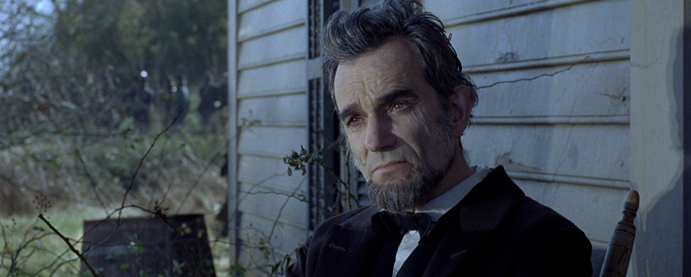 |
| Daniel Day-Lewis as Abraham Lincoln. |
DAVID SELBY: I haven’t seen it. But I’m a great fan of
Daniel Day Lewis, so I can’t imagine that I would not like it. Can you?
No, my wife and I were actually talking about going to see
it last night and … you know how things
happen.
DAVID SELBY: Wallace, listen, trust me, we haven’t even
gotten to the James Bond film. I hadn't seen the George Clooney film, the one
that takes place in Hawaii … we just watched that the other night. I get behind
all of these things. Warners just sent me … THE DARK KNIGHT (RETURNS,) it’s an
animation thing. I’ve got a new edition Gene Kelly’s SINGING IN THE RAIN. We
have so many things to watch and are so far behind. So no, we have not seen
LINCOLN yet. We’ll probably get it on Netflix.
(Note: The interview above was abridged for space. For the full audio of the interview, visit our podcast page.)

